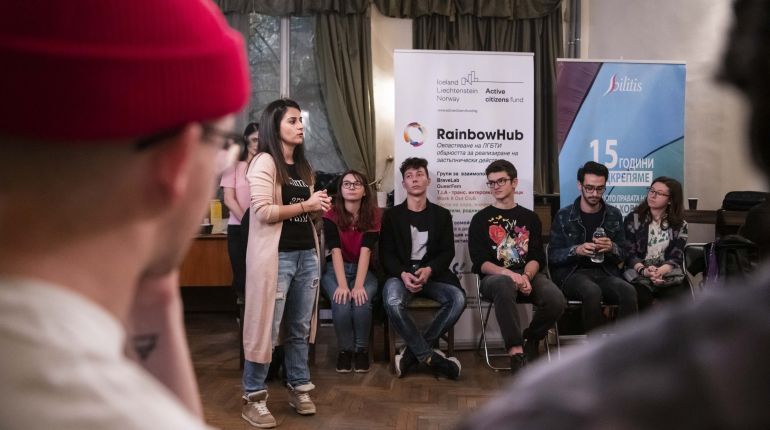The European Economic Area Financial Mechanism and the Norwegian Financial Mechanism publish on their official web-page a series of narratives called "Stories of hope", related to the Covid-19 crises. One of the participants of the Initiative, Lili Dragoeva, made it to the list of good examples. Lily is the executive director of the organization Bilitis – the oldest LGBTI organization in Bulgaria. She shares how she and her team have been able to deal with the aftermath of the crisis and even bring their community closer together than before.
We present to you the inspiring story of Bilitis, translated and adapted into Bulgarian, about how it is possible to make good benefits out of every situation. The original article can be found HERE.
" How the Covid 19 quarantine has made Bulgaria's LGBTI community more united virtually”?
Like many other countries, Bulgaria has declared a state of emergency to fight the coronavirus pandemic and limit its spread. This situation has predictably had its effects and consequences. Alongside the health crisis and its devastating consequences, COVID-19 affected many civil society organisations who suddenly found themselves far removed from the communities they represent and protect.
Bilitis, the oldest LGBTI organisation in Bulgaria, was able to anticipate in time that the Covid-19 crisis should not limit meetings with people entirely. The organisation runs the Rainbow Hub project, supported by EEA grants, and focuses mainly on mobilising the LGBTI community and building its capacity through dedicated self-help groups.
Due to the crisis, they are having to cancel all physical activities at the Rainbow Hub Community Center. They understand that in order to make reasonable use of the situation and preserve their project and community, they need to digitize their work. As a result, they began to maintain their community virtually, reaching even more people than usual while keeping hope alive.
For Bilitis, the crisis means not being able to physically meet with their groups in order to avoid the spread of the virus. "Protecting the health of everyone we work with and their loved ones is an absolute priority for us, so we cancelled all of our community meetings and events during the day," explains Lili Dragoeva, Rainbow Hub project manager.
Before the crisis, they met regularly at the Rainbow Hub community centre in Sofia. After the social distance became a fact, they had to find another way to bring the groups together - without meeting in person. And as they say, where there's a will, there's always a way - even if it's virtual.
"Canceling the physical meetings didn't mean we wouldn't be there for our community! We believe that it's even more important to support each other in difficult times, so we're reinventing new ways to meet. "Lili Dragoeva shares.
When one door closes, another one opens
Using phones, laptops and virtual meeting rooms, Rainbow Hub working groups are able to meet again - safely. The eight groups covered by the project, such as the BraveLab LGBTI youth group, the LBTQ women's group QueerFemme and the trans and intersex group T.I.A, have found a new home online. In doing so, they have also become much more accessible.
„ If it weren't for the state of emergency, we wouldn't be so accessible to many in the LGBTI community."
Soon after the digitalization, Bilitis noticed a positive change. New participants living in locations outside the capital joined the working group sessions. "Many people who couldn't join our meetings because they lived in other cities or abroad suddenly became regular attendees," says Lily. It's such a positive trend that the organization decided to keep up its online activities - even after the removal of the lockdown.
The right support at the right moment
The coronavirus has its financial, social and not least emotional consequences for many of us. The state of emergency has affected us in unprecedented ways - it has changed the way we live, work, interact and relate to each other. Stress, anxiety and depression are just some of the harmful health impacts the crisis has had on people.
The Rainbow Hub project aims to support LGBTI people in times of hardship, so Bilitis is organising a series of free online psychological support meetings for members of the eight self-support groups - and anyone who needs it. The sessions, called #WithCareToMe, are led by an experienced psychologist and psychotherapist and cover topics ranging from adapting to change to managing fears, anxieties and self-care during isolation. All topics are chosen by the participants themselves through the organisation's social media channels. "This way, we ensure that we are as helpful as possible and are able to respond appropriately to the needs of the community," explains Lily."
